Panoramica
Fotovoltaico (fotovoltaico), come industria nascente nel nuovo mercato energetico, è fiorente. Tuttavia, the unpredictability of the market and investment costs also pose operational challenges for investors who are interested in it.
Tuttavia, solar energy is one of the most cost-effective sources of new energy, and energy storage technology is an indispensable part of supporting photovoltaic systems to provide longer periods of energy in the absence of sunlight.
Because we all know that photovoltaic energy storage systems are greatly affected by weather, and their power generation will decrease on cloudy days. In questo momento, photovoltaic energy storage becomes particularly important.
Photovoltaic energy storage systems can be integrated with solar panels to provide additional solar energy. These storage technologies allow you to have peace of mind by storing energy for future use.
This article introduces photovoltaic energy storage to you from multiple perspectives, and I believe it will be helpful to you.

1.Definition of photovoltaic energy storage systems
1.1 What is a photovoltaic energy storage system?
Photovoltaic energy storage system is a combination of equipment and technology, based on photovoltaic accessory equipment, which converts solar energy into electrical energy with technical support, supplies power to loads, and stores excess electrical energy for use at night or when there is no public grid power supply.
Its solar cells capture and store solar energy. They can serve as backup power sources during power outages and lack of sunlight, and provide support for homeowners and business owners who want their own energy independence.
1.2 How does a PV cell system work?
Fotovoltaico (fotovoltaico) panels capture sunlight, which is then converted from direct current (DC) electricity to alternating current (AC) electricity for end-users through a photovoltaic inverter. The electricity generated at this time will be immediately consumed, and can also be sold to public grid operators or stored in storage devices with capacity for backup.
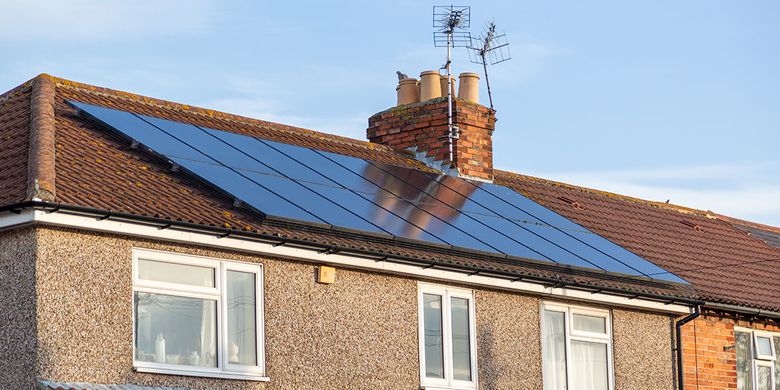
2.What are the main components of photovoltaic energy storage?
2.1 Photovoltaic modules
Composed of several photovoltaic modules (also known as solar panels), responsible for capturing sunlight and converting it into direct current (DC).
2.2 Supports, accessories, and cables
PV support is used to fix solar panels and transmit the generated DC power to the inverter.
2.3 Photovoltaic inverter
By inverting the direct current (DC) generated by solar panels, alternating current (AC) is generated, and excess electrical energy is stored in the photovoltaic energy storage system.
2.4 Energy storage equipment
Usually refers to types of batteries such as lithium-ion batteries, which store the electrical energy generated by solar panels that is not immediately used.
2.5 EMS and BMS
EMS is a system that monitors and manages the entire system to ensure the normal operation of all parts. BMS is a battery management system responsible for controlling the charging and discharging of batteries.
2.6 Confluence box
This includes various protective equipment and switches, such as surge protectors (lightning arresters), fusibili, mains input circuit breakers, uninterruptible power output circuit breakers, and other operating equipment in the middle of solar energy connected inverters.
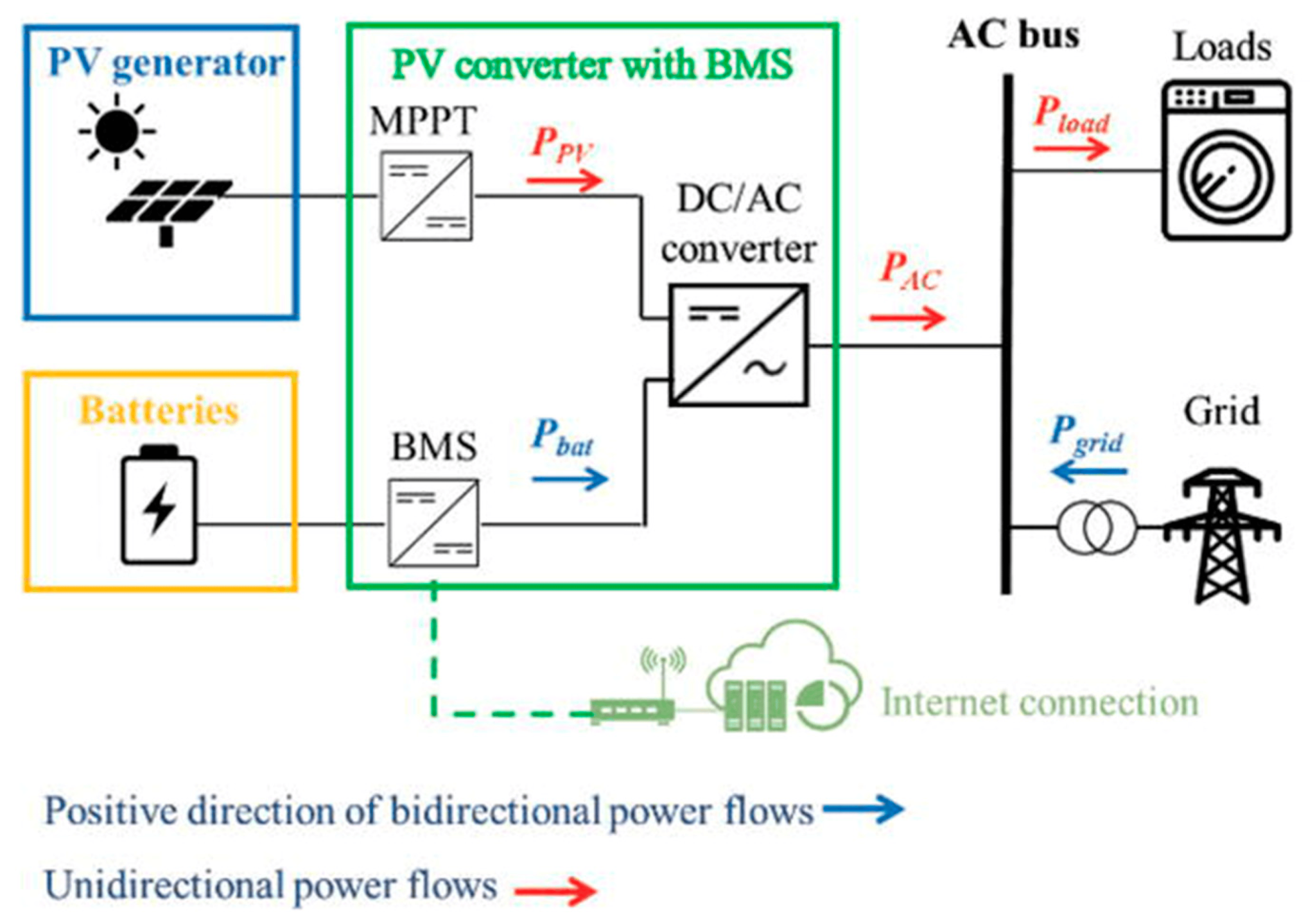
3. The process of obtaining electrical energy from solar energy in photovoltaic systems
3.1 Photon absorption
When sunlight shines on the material of the solar panel (now usually monocrystalline silicon), the energy of photons is absorbed by the semiconductor material.
3.2 Excitation of electrons
The absorbed photon energy causes electrons in semiconductors to transition from the valence band to the conduction band, transitioning from a bound state to a free state.
3.3 Establishing an electric field
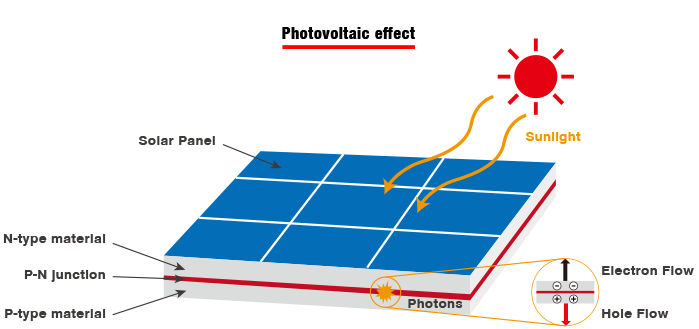
There are usually P-type and N-type regions in photovoltaic materials, and an internal electric field is formed at the junction of these two regions (i.e. PN junction).
3.4 Generating current
This internal electric field drives free electrons to move towards the N-type region and holes to move towards the P-type region, which generates current.
3.5 Storage of electrical energy
Lithium batteries convert this current into AC or DC through an inverter and store it in the photovoltaic energy storage system for future use.
4.How does a photovoltaic energy storage system work?
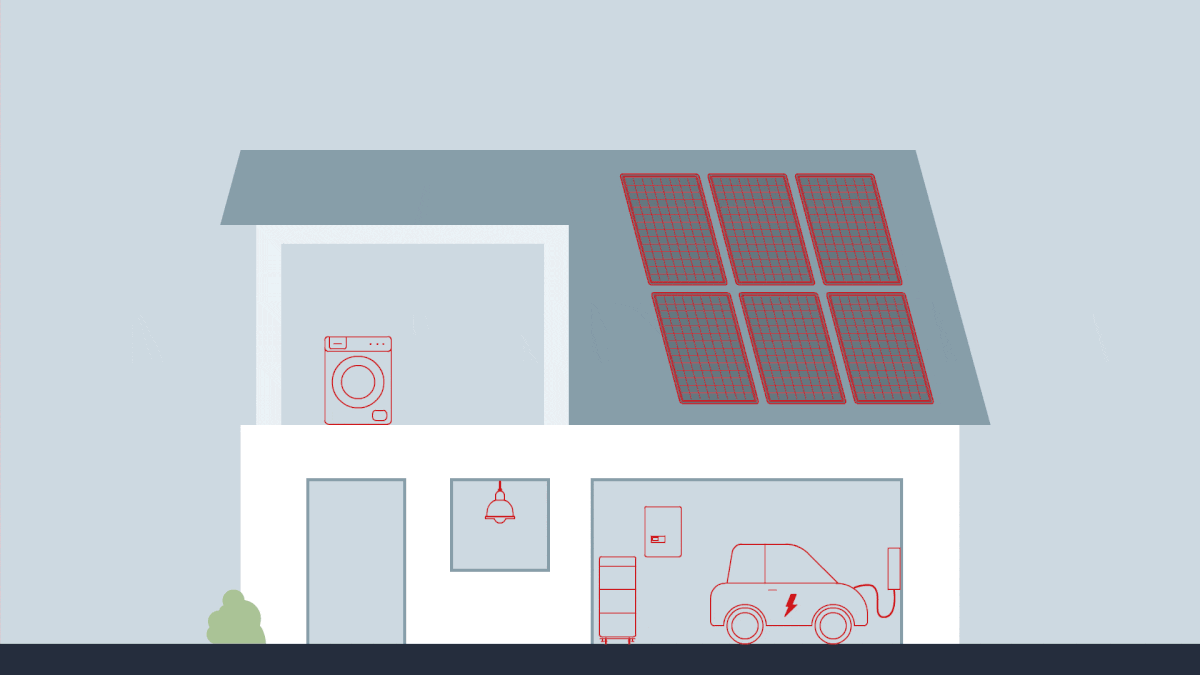
Solar panels themselves cannot store energy, but solar cells can. During peak hours of sunlight, the battery captures and stores unused energy in the photovoltaic energy storage system.
The following is the principle of integrated and collaborative work between solar cell systems and solar panel systems:
Solar panels collect solar energy in the form of direct current during the day. The solar panel inverter converts direct current into alternating current (AC) before it can be used by end customers. One or more rechargeable solar cells (più comunemente batterie agli ioni di litio) are directly connected to the solar system. The excess energy flowing into the battery during the day is stored by the battery.
This surplus power can be used at night or during power outages in the power grid. It is an excellent backup choice for photovoltaic energy storage intelligent systems. If it is a remote area or a user pursuing energy independence, this is also a matching choice for most people when choosing an off grid system.
5.Types of photovoltaic energy storage system usage
5.1 Spontaneous self use mode
Convert the electrical energy emitted by solar panels into alternating current (AC) and directly supply it to household appliances, while the excess electrical energy is stored by the energy storage system; If the current emitted by the solar panel is not sufficient to provide power for household appliances, use mains power to provide power.
5.2 Peak shaving and valley filling mode
During the set low time, convert the AC power from the public grid into DC power and charge it into the photovoltaic energy storage system; Durante i picchi di utilizzo dell'elettricità, convert direct current in the energy storage system into alternating current to supply household appliances; If the battery level is insufficient, it will be replenished by the municipal power grid. The biggest original intention of this model is to avoid high electricity bills appearing on bills, which is also a unique advantage of photovoltaic systems serving users.
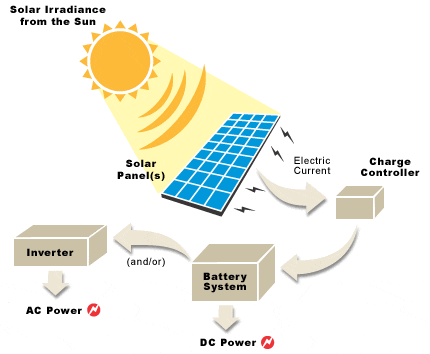
5.3 Battery priority mode
In any case, the first step is to ensure that the energy storage system is fully loaded. When the photovoltaic system generates a large amount of electricity, it is directly converted into AC power for battery use. When the grid connection function is enabled (provided that this networking mode is selected), the excess electricity is returned to the grid and a certain amount of revenue can be collected.
6.What are the benefits of photovoltaic energy storage?
6.1 Reduce costs
Storing and using more energy in one’s own solar photovoltaic system can more effectively reduce electricity bills than using electricity bills provided solely by public utilities. In alcuni casi, depending on your battery capacity and energy generation and usage, you may be able to waive the corresponding electricity bills.
6.2 Energy independence
Photovoltaic energy storage can efficiently utilize solar energy as a green energy source, and equipped with a battery system, the storage capacity for delayed use is correspondingly improved. This should also enhance the self-sufficiency of end-users in both grid connected and off grid systems.
6.3 Backup power supply
Having a photovoltaic energy storage system is crucial during power outages or lack of sunlight, ensuring the reliability and flexibility of energy storage, as well as the safety of use.
6.4 Make your life better
Choosing a photovoltaic energy storage system is based on whether it can help you live a better life, whether it is reducing electricity costs or a more suitable way of life (such as remote areas being more suitable for photovoltaic energy storage off grid systems), because it is a valuable investment project.
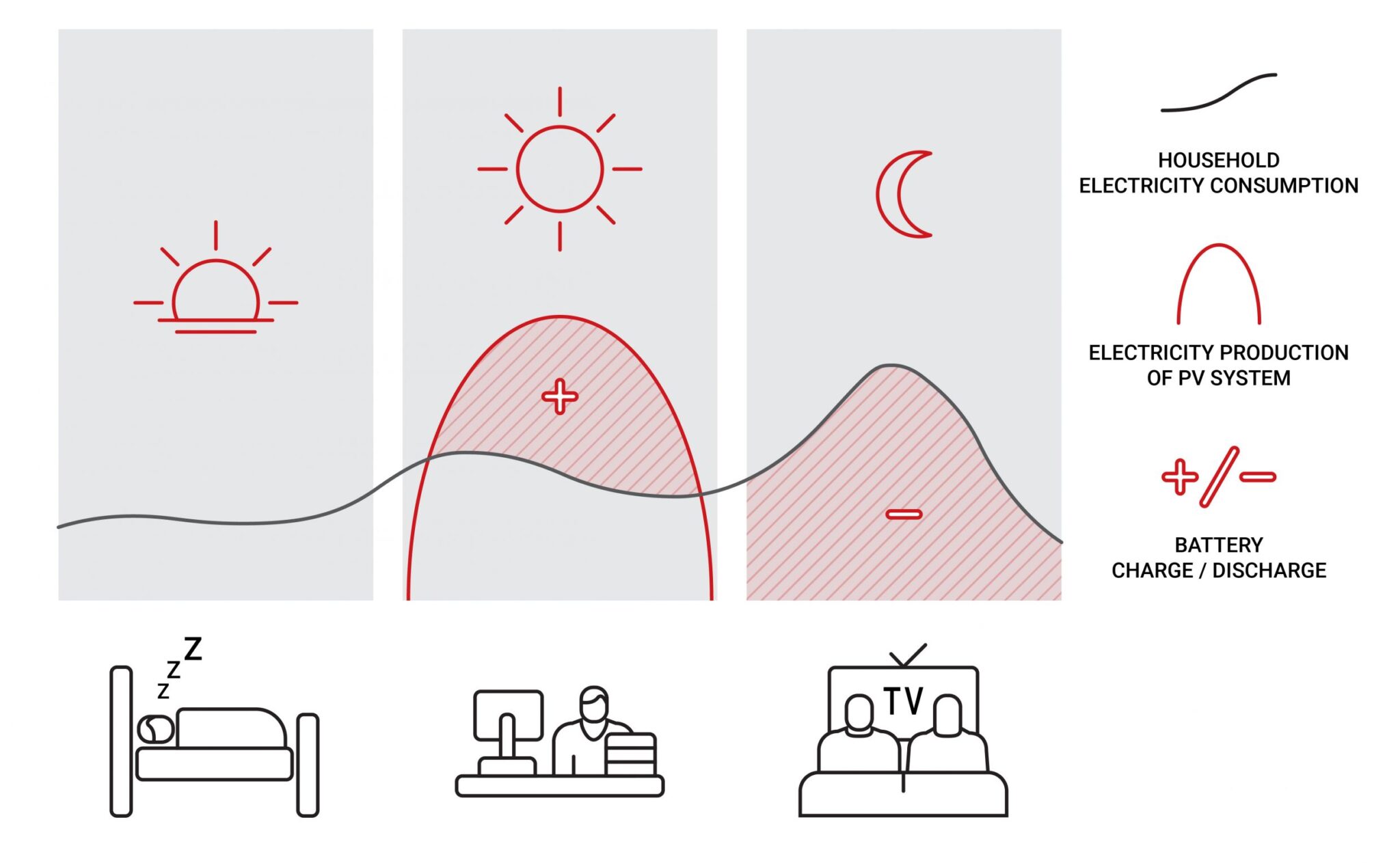
6.5 Sostenibilità
Photovoltaic energy storage systems use renewable energy, which can reduce your carbon emissions. They are also more environmentally friendly than other backup power sources, come i generatori diesel, because they do not use fossil fuels.
Allo stesso tempo, photovoltaic energy storage is also a long-term sustainable energy solution, which is currently the most promising and hottest choice for market transformation.
Conclusione
The photovoltaic energy storage system generates solar energy when there is sufficient sunlight. The electricity generated by photovoltaic storage is stored by batteries, which can serve as a backup power source in case of bad weather or power outages, becoming a powerful guarantee.
The electricity generated by photovoltaic energy storage system can save electricity costs and reduce billing costs. Even worse, electricity can be transmitted back to the public grid to earn a certain amount of money.
Photovoltaic energy storage is one of the few industries with a very strong upward trend in the global economic downturn. If in the new energy tram industry, end users need to worry about the reliability of the brand they choose, and it is necessary to have their own product repaired.
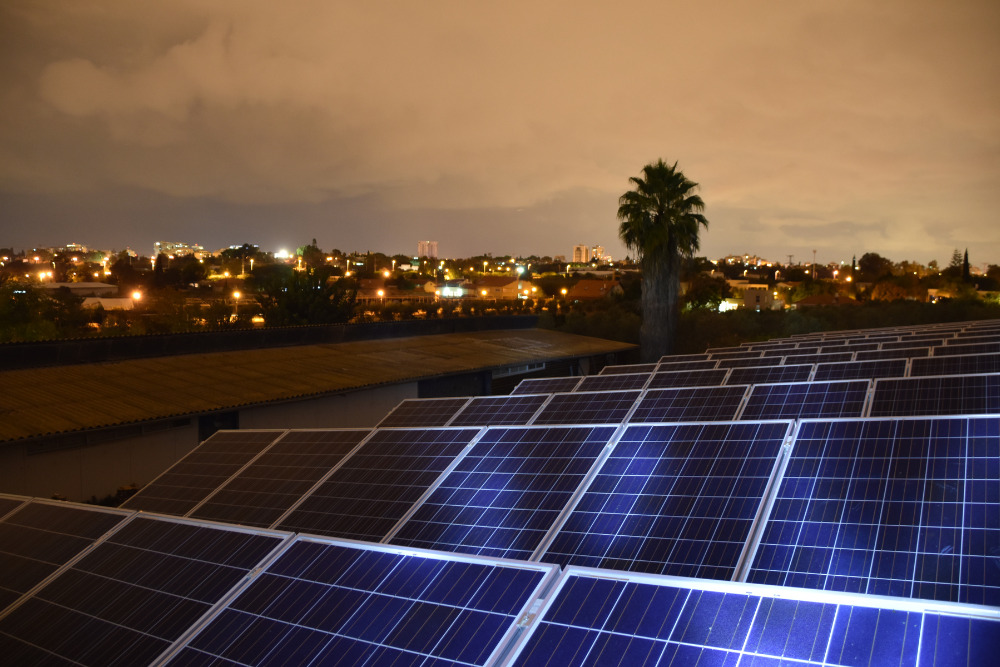
But in terms of photovoltaic energy storage, you don’t have to worry at all. Unlike electric cars that need to compete with gasoline cars for market share, this industry itself is a level one in the power grid system. In an environment where electricity is needed, you just choose how to generate the electricity. And when choosing grid connected or mixed mode, this may also bring you benefits.
It can be said that choosing photovoltaic energy storage has led to a better life.
